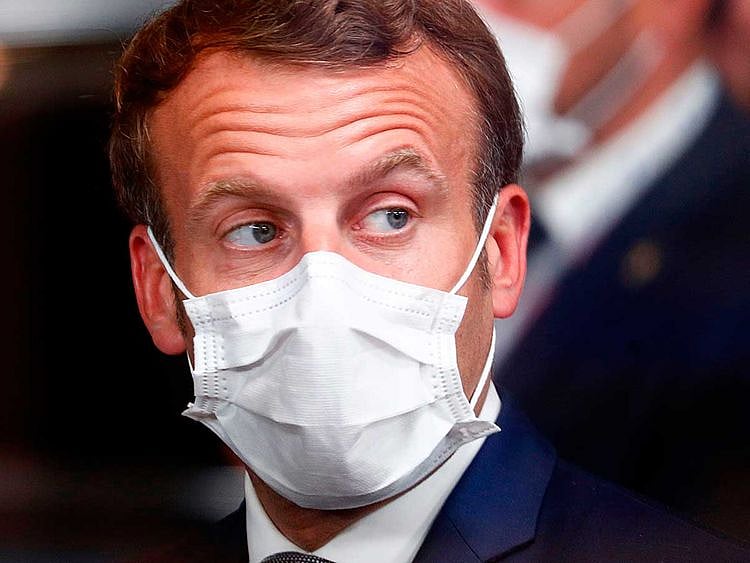Will the real Emmanuel Macron please stand up?
French president has inspired Europe but can’t catch a break at home

A little more than three years ago, when Emmanuel Macron burst onto the national and international stage as the fresh enthusiastic president of the French Republic, he was likened to Europe’s answer to Canada’s Justin Trudeau — youthful modern, fresh, charismatic and engaging. Now, facing re-election in less than two years’ time, he seems about as fresh as a stale baguette — leaving few French with any appetite for his policies no matter how hard he tries to sell them.
Ironically though, in Brussels and at the top echelon of the European Union, Macron is viewed as the leader who finally managed to convince German Chancellor Angela Merkel to relinquish her tight teutonic grip on the purse strings and back a huge €750 billion (Dh3.14 trillion) coronavirus package on borrowed money. Even at the height of the Eurozone debt crisis, when it seemed as if Greece, Italy, Cyprus, Portugal and Spain might be subsumed, Germany refused to contemplate Europe-wide lending.
But coronavirus is different. And France is different because of coronavirus — which is why Macron faces a tough task convincing French voters he deserves a second term come April 2022.
For sure, Macron is trying but it certainly seems as if for now, he hasn’t got the ear of French voters, at least judging by the reaction to his Bastille Day announcement to spend €100 million on national recovery plans. And that’s on top of another €460 billion he already outlined as the French economy — and most of the rest of the world too — were placed in hibernation as the pandemic took root in the early spring.
Bastille Day pledge to green France’s economy
Simply put, the French economy has failed to shake off the effects of that hibernation. Despite Macron’s July 14 pledge to spend more on making the French economy greener, cleaner and leaner, there are many in his nation of 67 million who are sceptical. Even before the pandemic hit, the French economy wasn’t exactly firing on all four cylinders. Unemployment was stubbornly high at 7.8 per cent, the lowest since the 2008 financial crash but still above the EU overall average — even if new business creations were humming along nicely. By the time of the economic pandemic is through, Macron can count himself lucky if unemployment rolls only rise by 1.5 million. More is probably likely, French economists and business leaders say. Macron has announced job creation initiatives and apprenticeship schemes for some 500,000 mostly young people.
For the past two years, the gilets jaunes — the so-called yellow vests known for the high-visibility jackets they wear — had continuously protested in mostly provincial cities and small towns across France, upset at the high cost of living, high taxes and reduction in social spending that hits rural France hardest
No sooner had Macron addressed the French people on Bastille Day than he went for a walk in a Parisian park — and was accosted by gilets jaunes, creating a security nightmare for the French president entourage.
Also Read
Newsmaker: Is Kanye serious about running for president?Brexit: No-deal spectre is looming againWhy the Balkans are on the agenda in BrusselsNow, the EU can finally get down to workNewsmaker — Why everyone is so upset with Mark ZuckerbergAccording to estimates by the European Commission, the cabinet-like structure that oversees the day-to-day running of the EU, the French economy will shrink by 10.6 per cent because of coronavirus — just behind the rates of contraction for both neighbouring Italy and Spain. Even with a best-case scenario of 9 per cent as detailed by the Bank of France, the French economy won’t be anywhere back to normal before the April 2022 poll rolls around.
As things stand now and as a result of the measures announced by Macron to try and jump start the post-coronavirus economy back to like, for every €1 in circulation in France, a further €1.20 will be owed to lenders. Just before the pandemic struck, French borrowing was pretty much spot on 100 per cent of Gross Domestic Product, now it is to rise to a worrisome 120 per cent. Small wonder then that some in Germany might question just whether indeed it is wise or prudent for Merkel to listen to the economic arguments proffered by a French president who has failed to keep his fiscal house in order in Paris.
In early July in an attempt to revive his fortunes Macron took the political scalpel to his cabinet and appointed Jean Castex, a popular centre-right mayor from Prades in the Pyrenese Orientales, as his prime minister.
Drift at the Elysee Palace
It was a choice that might help Macron’s political party grow in a nation normally focused mainly on Paris, but realistically, with Macron failing to pick up a leadership bounce from coronavirus as witnessed by Merkel and other European leaders, it only adds to a perception of drift at the Elysee Palace. Voters blame Macron for a shortage of masks, gloves and other personal protective equipment — confirming a popular belief he is a technocrat who has lost touch with ordinary French citizens. Certainly, the confrontation with the gilet jaunes on Bastille Day has only cemented that perception.
For Marine Le Pen, likely to be his main rival once campaigning begins in earnest, the sense of drift surrounding Macron is welcome news indeed. Barely 40 per cent of voters think the government is doing enough to help recover from the coronavirus pandemic.
Sign up for the Daily Briefing
Get the latest news and updates straight to your inbox
Network Links
GN StoreDownload our app
© Al Nisr Publishing LLC 2026. All rights reserved.